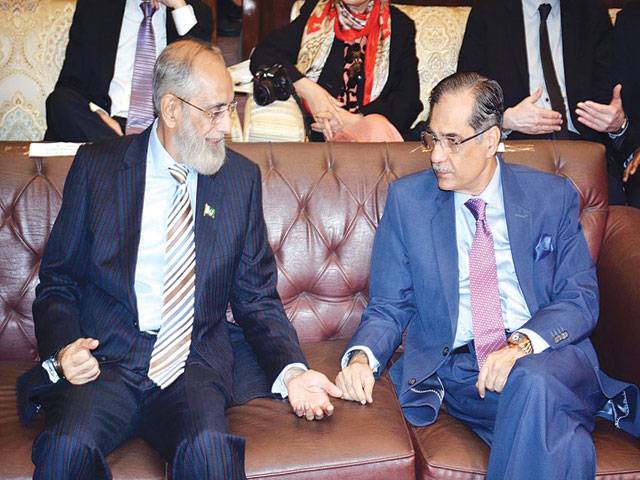ISLAMABAD - Justice Mian Saqib Nisar, the next Chief Justice of Pakistan, is a very dynamic judge and has sharp judgment power.
He strongly believes in rule of law and supremacy of the Constitution and does not like apex court intervention in the functions of other state organs.
In an additional note on the judgments of 18th and the 21st constitutional amendment, he wrote: “It would not be right ethically, legally or constitutionally for the Supreme Court to deny primacy of the Constitution and the right of elected representatives to amend it.”
The judge also criticised the apex court’s judgment in Zafar Ali Shah case, in which the acts of a military dictator had been validated.
“Amazingly, after upholding the “validity” of the military takeover, this court went on to “confer” powers on the army chief to single-handedly and unilaterally carry out constitutional amendments,” he added in the dissenting note.
Justice Saqib would remain Chief Justice of Supreme Court for two years (till January 14, 2019). Many people consider him close to the ruling party as he was appointed Law and Justice secretary on 29-03-1997, during PML-N’s second government.
It was the first time in the history of the country that someone from the bar had been appointed to such post; otherwise, the retired judges of the high court or Supreme Court become law secretaries.
However, Justice Saqib recently during the proceeding of a case categorically said that he was not friend of anyone. He remained federal law secretary for almost one year and later was elevated as the judge of the Lahore High Court and then of the Supreme Court on 18-2-2010.
The upcoming CJP has very good expertise in civil, commercial, tax and constitutional matters, but Panama leaks case would be a challenge for him as PTI Chairman Imran Khan wants the apex court to decide the case itself.
The PTI counsel said if a commission is formed, they would boycott its proceedings; while the top court five-member bench, headed by Chief Justice Anwar Zaheer Jamali, has already declared that they cannot decide the case without thorough investigation.
Justice Saqib believes that all the government functionaries and the institutions should perform duties strictly in accordance with the law.
He, in a judgment about the authority of PM delivered this year in August, wrote: “The prime minister on his own can’t take decisions regarding ordinances, bills, and financial matters. The federal government is the collective entity described as the cabinet, comprising prime minister and the federal ministers.”
The judgment further said that neither a secretary, nor a minister and nor the prime minister “are the federal government and the exercise, or purported exercise, of a statutory power, which is exerciseable by the federal government if exercised by any of them, pertaining to fiscal matters will be constitutionally invalid and nullity in the eyes of law.”
On the suo motu power of the Supreme Court, the honourable judge was of the view that this power should be exercised with extreme caution.
Justice Saqib is also very sensitive to the minorities’ issues. In July, heading a three-judge bench, while hearing the appeal of blasphemy accused Aasia Bibi, he suspended the Lahore High Court judgment. The LHC had maintained Aasia’s death sentence. The 45-year-old Christian woman has been on death row since November 2010.
The lawyers expect that the bar and bench relation would further strengthen and judicial activism within the legal frame would gain little momentum under the new CJP.
However, Pakistan Bar Council Vice Chairman Barrister Farough Naseem was of the view that there would not be much change as the incoming CJP would continue the policy of the incumbent Chief Justice Jamali, who would lay down his robe on December 31 on attaining the age of superannuation. He said that Justice Saqib already has good relationship with the bar and he would maintain it.
Tariq Asad said that Justice Saqib Nisar has a very pleasant personality and he likes to keep everyone happy. “During former Chief Justice Iftikhar Muhammad Chaudhry, we have seen unanimous verdicts by the Supreme Court but after his retirement majority of judgments passed were dissenting. Though some lawyers consider it healthy, others view it a division in the apex court,” he remarked.
Besides Panama case, another issue for Justice Saqib would be how to reduce the pending cases in the Supreme Court, which are around 30,000. Yet another important issue would be the complaints against the superior courts judges, including Islamabad High Court Chief Justice in the Supreme Judicial Council.






